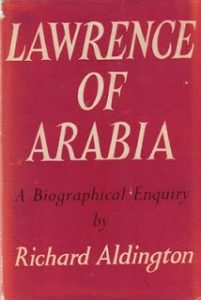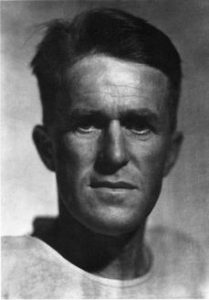
Lawrence of Arabia: A Biographical Enquiry
Richard Aldington
Published by William Collins (1955)
I have been working very hard on a biography – the most difficult and dangerous job I ever undertook (Richard Aldington to Henry Slonimsky, December 1949)
When he turned to the existing accounts of Lawrence’s life and achievements, what amazed Aldington was that, in concentrating on the legendary leader, they ignored such considerations as whether he was the originator of the idea of provoking and exploiting the Hashemite rebellion or of the strategy of sabotaging the Turkish rail network, or whether he was even the principal saboteur. Furthermore, they failed to acknowledge that the factual basis on which they formed their judgements stemmed almost entirely from Lawrence himself.
As Aldington uncovered more and more evidence that challenged these accounts and contradicted Lawrence’s own stories, he became more and more angry. This was to have a damaging impact on the tone of his own biography. There is one achievement which nobody can deny Lawrence, and that was his capacity to convince others that he was a remarkable man. Of course he was, but what was chiefly ‘remarkable’ was his capacity for self-advertisement, he would write.
 A passage towards the end of the book reveals the source of his anger:
A passage towards the end of the book reveals the source of his anger:
I have tried, but perhaps not always with success, to give the evidence in this book fairly and in such a way that it can be instantly verified, though not without some indignation that such a man should have been given the fame and glory of the real heroes of 1914-1918.
It outraged him, as one who had witnessed the sufferings and endurance of the troops on the Western Front, that the whole trend and assertiveness of ‘Seven Pillars’ (and extracts in ‘Revolt’) are designed to insinuate that the Eastern war was the really important one and that the important contribution to that war came from Lawrence and ‘the Arabs’.
The writer Richard Church wrote to Aldington on 12 December 1954, a month before the book appeared: The fore-shadow of your Lawrence has been looming ominously over the literary (and indeed social and political) skies for the past two years, and everyone has been whispering in corners about it, some with glee, others with shocked horror. … [Y]ou will have to seek a refuge in the South Seas as the fanatics come after your blood. What about all the deeply entrenched vested interests in the great legend? How are you going to cope with them? However, you are not lacking in courage and punch and I imagine that you have your jet planes and atom bombs fully lined up,
Church was over-optimistic; in the event the onslaught by Lawrence’s admirers and supporters was overwhelming.
Instead of a carefully considered portrait of Lawrence I find the self-portrait of a bitter, bed-ridden, leering, asthmatic, elderly hangman of letters, Robert Graves (the author of one of those earlier adulatory biographies of Lawrence) wrote in The New Republic.
The work of the Lawrence supporters ensured that this was the representation of Aldington put before the public in the years following. Nor did the book enhance his financial security: the delays over its publication caused by legal wrangling and the opposition of the political establishment had ensured that he had no income for four years, and, although the book was a best-seller, Collins withdrew it as soon as they had recouped their investment. Furthermore, now that Aldington had become a pariah, critics ignored him, publishers were reluctant to be associated with him and book-sellers ceased to stock his earlier works.
By the time Aldington died in 1962, the tide had begun to turn and it had become possible to challenge the legend, although, in the David Lean film, released that very year, Peter O’Toole’s performance reignited the charismatic appeal of Lawrence.
In his book about the whole tragic saga, Fred Crawford writes:
Aldington’s most striking achievement was to challenge the TEL legend despite encountering practically every obstacle that a biographer might face. With a minimum of resources and in virtual isolation, he overcame organised and dedicated opposition from powerful and influential friends of TEL, an uncooperative literary estate, a reluctant publisher, limitations on access to significant material and severe restrictions from libel and copyright laws, all of which hampered his ability to tell the truth as he saw it. That he succeeded was the result of incredible courage, intellectual rigor, and determination even as he coped with crises of confidence, domestic troubles, financial woes and failing health. His passion for truth gave him little choice. Had he foreseen the high personal cost of his TEL book, he would have written it anyway.
